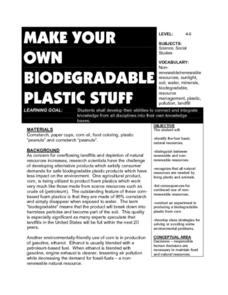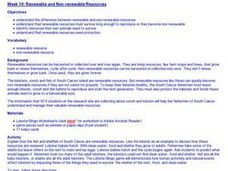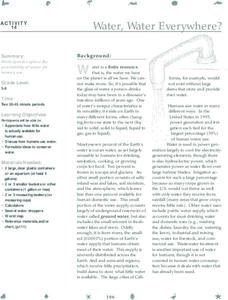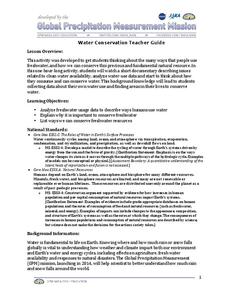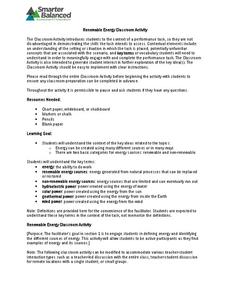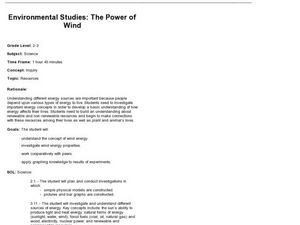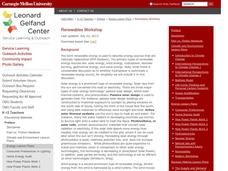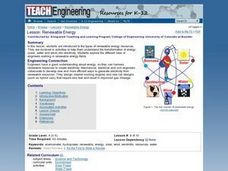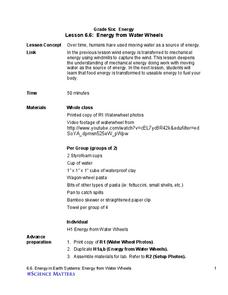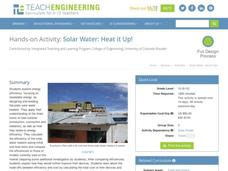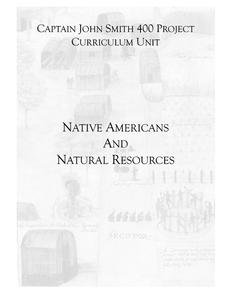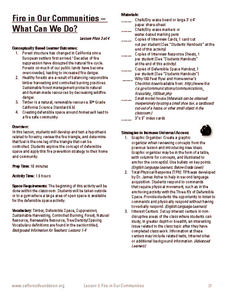Curated OER
Renewable vs. Non-Renewable Resources
Here's a fine lesson plan on renewable and non-renewable sources of energy for your 5th graders. In it, learners list a number of natural resources on the board, then try to sort the resources into appropriate categories. This helps them...
K12 Reader
Natural Resources
What natural resources are available in your area? Your learners can consider this question after reading a brief passage about natural and renewable resources. After reading, class members respond to five questions related to the reading.
Cal Recycle
Conserving Natural Resources
Trying to plan an engaging elementary science unit on natural resources? Conserve your energy! This five-part series of lessons and hands-on activities has exactly what you need to teach young scholars about the importance of conservation.
Curated OER
Our Natural Resources
Soil, water, fish, wildlife and forest are the main resources that are reviewed in this PowerPoint. Overuse and waste versus the value of the resources used and the long-term impact is covered in this clear presentation. It would be good...
Curated OER
Natural Resources: Can We Use Them Forever? Grade 2
Bright colors and animation are great ways to attract a young students attention. Students are introduced to the concepts of renewable and non-renewable resources as they pose the question, will our resources be around forever? This...
iCivics
Washington’s Water
It's easy to forget about something as simple as water, a substance that is easily available to many in the world. However, understanding water management and the importance of a renewable resource system becomes clear in an informative,...
Curated OER
Make Your Own Biodegradable Plastic Stuff
Students identify the four basic natural resources. They distinguish bettween renewable and non-renewable resources. Pupils recognize that all natural resources are needed by living plants and animals. Students list consequences for...
Curated OER
Renewable and Non-renewable Resources
Students play Lobster Bingo on a provided worksheet. This game demonstrates how human activities and natral events affect lobsters by impacting their food, clean water, and shelter of the reef.
US Geological Survey
Water, Water, Everywhere?
Less than one percent of the earth's water is available for human use. A hands-on activity models the phenomenon for young scientists. Beginning with a specific volume of water, learners remove water that correlates to the percent of...
K12 Reader
Limited Resources
The difference between renewable and non-renewable resources is the focus of a short reading comprehension worksheet that asks kids to respond to a series of questions based on the provided passage.
Curated OER
Water Conservation
Open learners' eyes to the challenge of finding safe drinking water – something we often take for granted in our country. The PowerPoint presentation includes images, graphs, diagrams, and even a video to stimulate discussion on how we...
Smarter Balanced
Renewable Energy
Renewable and non-renewable energy sources are the focus of a series of activities that prepare learners for a performance task assessment on energy. Groups identify the various sources of energy and classify these sources as either...
National Geographic
The Role of Water in the Generation of Electricity
Not only do we need to drink water to survive, it has become increasingly important to us in its ability to help generate electricity. In some cases, it is renewable, and in others, it is not. Middle schoolers scrutinize a scenario by...
Curated OER
Energy From Wind And Moving Water
Second graders investigate air and water as two sources of energy. They determine that wind and moving water are renewable resources that have advantages and disadvantages in their use. Through the design and construction of wind- and...
Curated OER
Environmental Studies: The Power of Wind
Investigate the prospect of wind as a renewable resource. Second and third graders make a pinwheel, answer critical thinking questions, and then attempt to use wind power to wind string. I would be more apt to use this lesson in a 1st or...
Carnegie Mellon University
Renewables Workshop
Youngsters examine resource maps to find out which states are using solar and wind power and discuss as a class various other renewable energy sources. They use a provided data table to record pros and cons to each technology, build and...
Curated OER
TE Lesson: Renewable Energy
Students examine renewable energy sources such as solar, water, and wind. They experiment to determine how renewable energy is transformed into electricity. They investigate the role of engineers who work in the field of renewable energy.
Curated OER
Wise Use of Our Resources
In this resources worksheet, students will categorize 10 resources as either a renewable or nonrenewable resource. Students will then complete 2 short answer questions.
Curated OER
Global Resources: What Will You Do with Your Power?
Students examine the human impact on natural resources. They read and discuss an article, evaluate nations regarding their environmental problem-solving, develop a presidential speech on the environment, and conduct a natural resources...
K12 Reader
Limited Resources
Here's a comprehension exercise that asks readers to include direct quotes in their analysis of an article on ways to conserve natural resources.
Science Matters
Energy from Water Wheels
Historians believe the first vertical water wheel was invented in Rome during the Augustan Age. The sixth lesson in the series of 10 has scholars experiment with designing their own water wheels. Through testing various pastas and...
Teach Engineering
Solar Water: Heat it Up!
Young engineers are instructed to design and build their own solar water heaters. Then, they calculate the efficiency and cost and compare them to commercially available models. This is a full unit for pupils to apply their knowledge.
Curated OER
Native Americans and Natural Resources
North American Indian civilizations had already been in place for over 10,000 years before the arrival of European settlers. Introduce your young historians to Indian tribes that lived in the Chesapeake region in the early seventeenth...
Forest Foundation
Fire in Our Communities - What Can We Do?
Learn about defensible space and renewable resources with a lesson plan about forest fires. After exploring the ways that humans have impacted the environment, kids conduct mock interviews about differing points of view in the...








